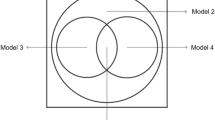Abstract
Queueing networks with repetitive-service blocking are investigated. The state probabilities are calculated by applying a new aggregation technique, the disaggregation-aggregation (DA) iteration. Thus, one obtains close approximate solutions with product form.
Similar content being viewed by others
References
I.F. Akyildiz and H. von Brand, Exact solutions for open, closed, and mixed queueing networks with rejection blocking, Theoretical Computer Science 64(1989)203 - 219.
B. Bärk, Aggregationsmethoden für Markovketten, Thesis, to be published.
P. Caseau and G. Pujolle, Throughput capacity of a sequence of queues with blocking due to finite waiting room, IEEE Transactions on Software Engineering 5(1979)631 - 642.
Y. Frein and Y. Dallery, Analysis of cyclic queueing networks with finite buffers and blocking before service, Performance Evaluation 10(1989)197 - 210.
W. K. Grassmann, Finding transient solutions in Markovian event systems through randomization, in: Numerical Solution of Markov Chains, Marcel Dekker, New York/Basel/Hong Kong, 1991, pp. 357 - 372.
V. Jonas, Iterative Analyse von Blockiernetzen mit alternierender Aggregation und Disaggregation, Master's Thesis, Universität Bonn, 1992.
A.M. Kagan, J.V. Linnik and C.R. Rao, Characterization Problems in Mathematical Statistics, Wiley, New York, 1973.
D. Kouvatsos and S. Denazis, Comments on and tuning to: MEM for arbitrary queueing networks with repetitive-service blocking under random routing, Research Report CS-18-91, Bradford, 1991.
D. Kouvatsos and N.P. Xenios, MEM for arbitrary queueing networks with multiple general servers and repetitive-service blocking, Performance Evaluation 10(1989)169 - 195.
J. Labetoulle and G. Pujolle, Isolation method in a network of queues, IEEE Transactions on Software Engineering 6(1980)373 - 380.
R.O. Onvural, Survey of closed queueing networks with blocking, ACM Computing Surveys 22 (1990)83-121.
H. G. Perros, Approximation algorithms for open queueing networks with blocking, in: Stochastic Analysis of Computer and Communication, ed. H. Takagi, North-Holland, 1990, pp. 451- 498.
J.Ch. Strelen, Iterative Analyse von Markov-Modellen mit alternierender Aggregation und Disaggregation, in: Messung, Modellierung und Bewertung von Rechensystemen IFB 286, eds. A. Lehmann and F. Lehmann, Springer, Berlin, 1991, pp. 320 - 336.
J.Ch. Strelen, Approximate product form solutions for Markov chains, Performance Evaluation 30(1997)87 - 110.
Rights and permissions
About this article
Cite this article
Christoph Strelen, J., Bärk, B., Becker, J. et al. Analysis of queueing networks with blocking using a new aggregation technique. Annals of Operations Research 79, 121–142 (1998). https://doi.org/10.1023/A:1018914503645
Issue Date:
DOI: https://doi.org/10.1023/A:1018914503645




